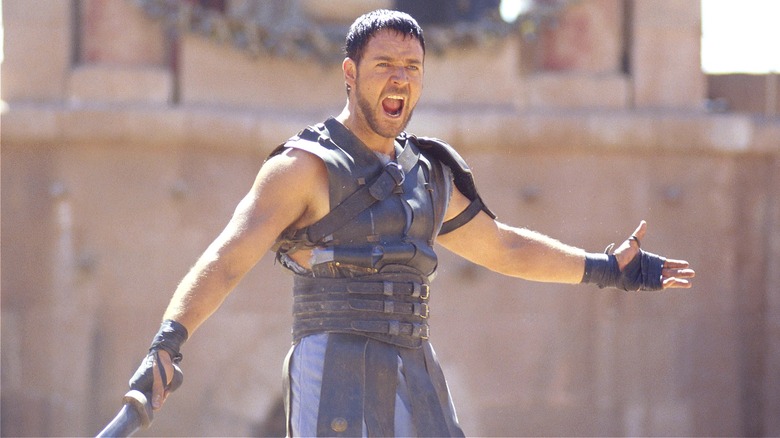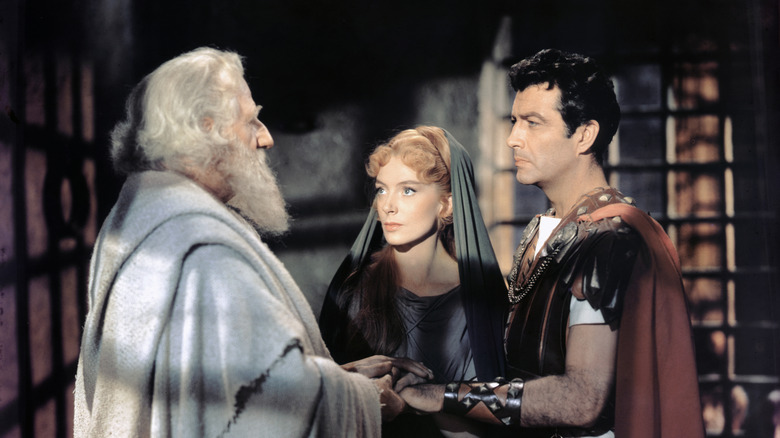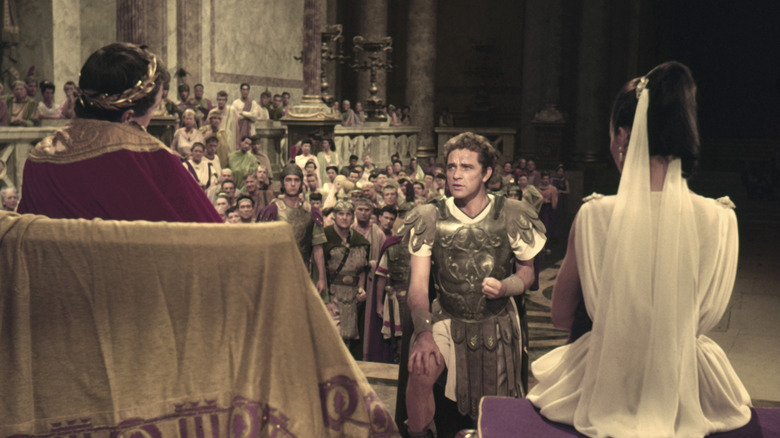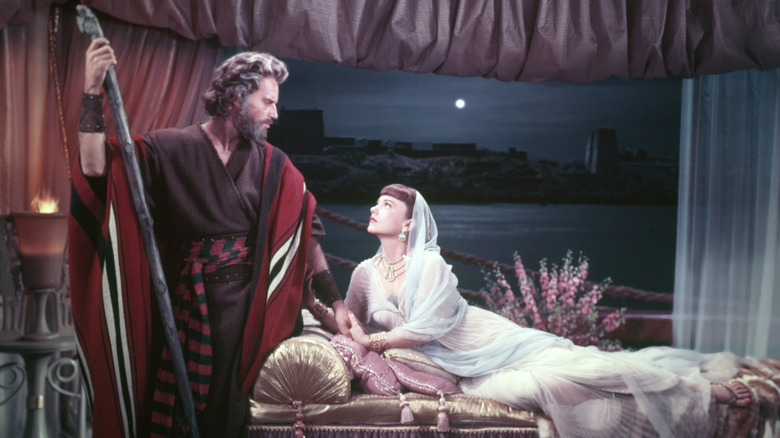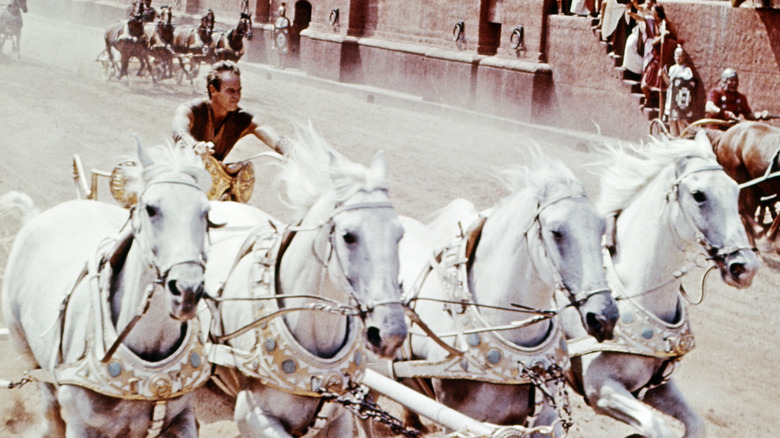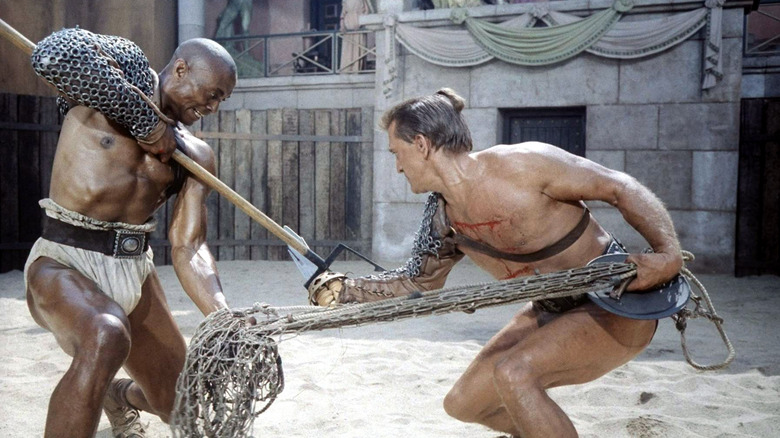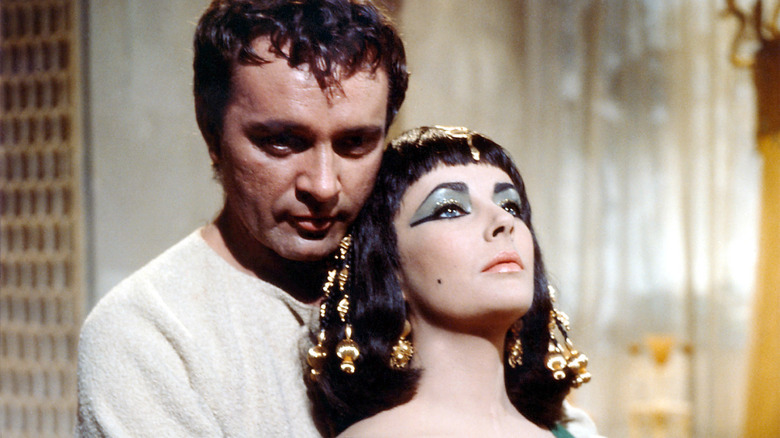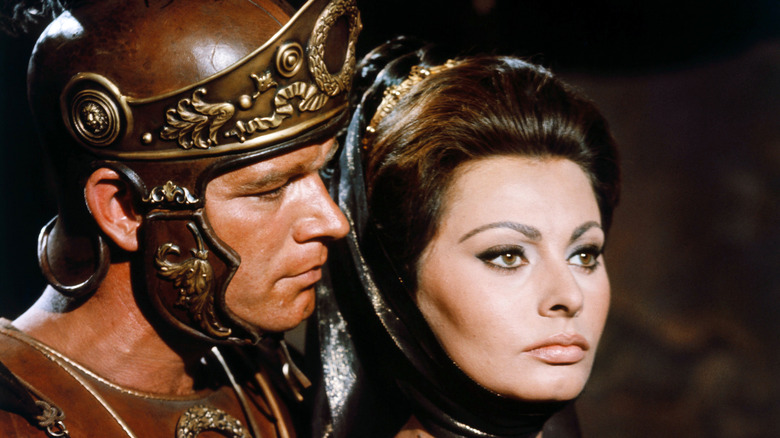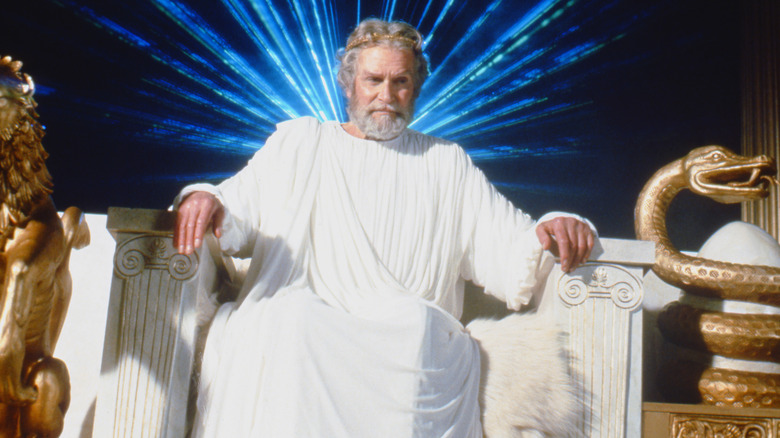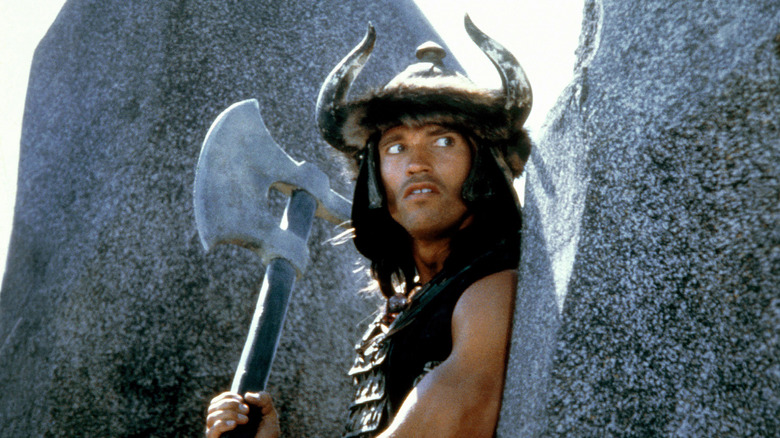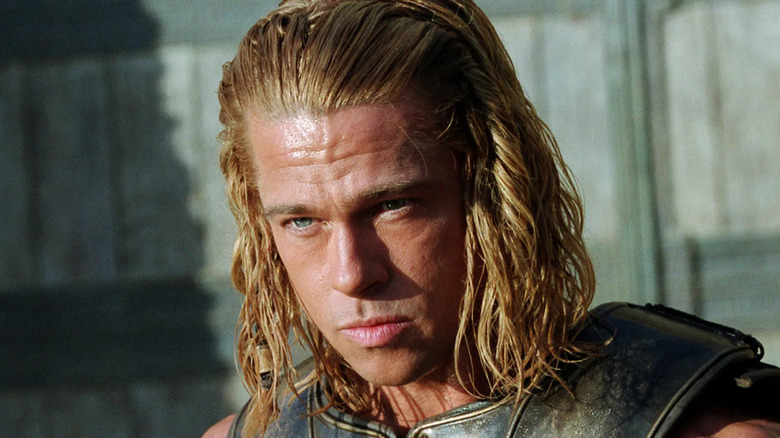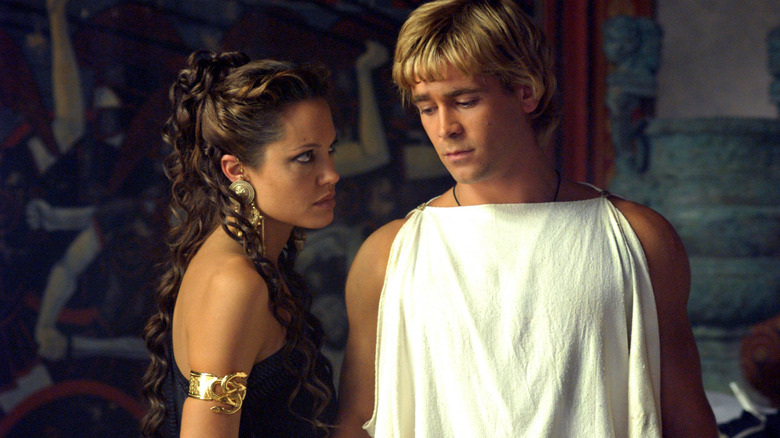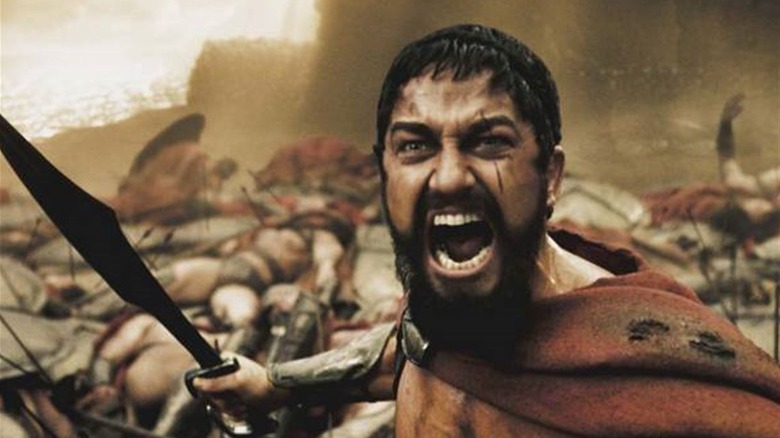12 Best Movies Like Gladiator
We may receive a commission on purchases made from links.
"Are you not entertained?" If you have ever seen Ridley Scott's "Gladiator," chances are you were. The 2000 Oscar-winner was a throwback to the sword-and-sandal epics of yore, tales of gods and mortals set in ancient Greece or Rome, filled with action, adventure, and spectacle. These Cinemascope sagas were a hot commodity throughout Hollywood's Golden Age, yet fell out of favor in the 1960s, when the studio system buckled under the weight of their massive costs and increasingly diminished box office returns. Yet "Gladiator," an action extravaganza about a Roman general (Russell Crowe) who becomes a gladiatorial hero after being sold into slavery, was a surprise hit both critically and commercially. When all was said and done, the film took home five Academy Awards, including best picture and best actor for Crowe, and spawned a long-awaited sequel, 2024's "Gladiator II."
If you've ever found yourself scrolling through whatever streaming service you've just watched "Gladiator" on and found yourself at a loss for what to check out next, fear not. Here are the 12 best movies like "Gladiator," from the Hollywood classics that inspired it to the contemporary epics that were inspired by it in turn.
Quo Vadis
Throughout the 1950s, most sword-and-sandal flicks were basically faith-based films, centering their stories on the persecution of Christians during the decline of the Roman Empire. While only some took their inspiration directly from the Bible, these titles were ultimately about the triumph of the faithful over disbelievers. Such was the case with "Quo Vadis," a 1951 adaptation of Henryk Sienkiewicz's 1896 novel that cloaks its pulpy melodrama in a blanket of Judeo-Christian morality. Robert Taylor stars as Marcus Vinicius, a Roman general who returns from a triumphant military campaign and falls in love with Lygia (Deborah Kerr), a follower of a strange new religion known as Christianity. As Emperor Nero (Peter Ustinov) targets Christians for persecution while Rome burns to the ground, Marcus must choose which side he's on: His emperor or his king.
Variety called "Quo Vadis" "a super-spectacle in all its meaning," while acknowledging certain shortcoming like the "captiousness about the story line" and "some of the players' wooden performances in contrast to the scenery-chewing of Peter Ustinov." The film earned eight Academy Award nominations, including best picture and best supporting actor for Ustinov, and stayed atop the box office chart for six consecutive weeks.
Cast: Robert Taylor, Deborah Kerr, Leo Genn, Peter Ustinov
Director: Mervyn LeRoy
Rating: NR
Runtime: 171 minutes
Where to watch: Amazon Prime
The Robe
Released in 1953, "The Robe" has the distinction of being the first movie ever released in CinemaScope, the nascent widescreen filmmaking process meant to bring audiences back to theaters with the promise of watching stories unfold on a larger canvas than any television screen could offer. This biblical drama centering around a decadent Roman solider (Richard Burton) who finds his faith after winning Jesus's crucifixion robe in a dice game is made on a massive scale, with lavish sets and a cast of thousands filling every edge of the frame.
Bosley Crowther of The New York Times summed up the critical reception to "The Robe" when he wrote, "the mightiness of masses and the forms of heroes have never loomed so large as they do in this studied demonstration, projected by CinemaScope. But an unwavering force of personal drama is missed in the size and the length of the show, and a full sense of spiritual experience is lost in the physicalness of the display." Even so, the film managed to snag five Oscar nominations, including best picture and best actor for Burton, winning prizes for its art direction and costume design. More importantly, it ushered in a new era of big screen spectaculars which, for better or worse, dominated the next decade.
Cast: Richard Burton, Jean Simmons, Victor Mature, Michael Rennie
Director: Henry Koster
Rating: NR
Runtime: 135 minutes
Where to watch: Amazon Prime
The Ten Commandments
The granddaddy of all biblical epics, Cecil B. DeMille's "The Ten Commandments" has been a Passover/Easter weekend mainstay ever since it premiered in 1956. Clocking in at a massive three hours and 40 minutes, it tells the life story of Moses (Charlton Heston), a Hebrew who's raised as an Egyptian prince alongside his adopted brother, Rameses (Yul Brynner). When he learns of his true heritage, Moses seeks to free his people from enslavement, eventually leading them to salvation and delivering God's Ten Commandments to them.
DeMille's gifts for showmanship are on full display here, from Moses parting the Red Sea to God delivering his commandments by striking lighting upon stone tablets. His taste for melodrama and debauchery are also present, enlivening what might otherwise be a sanctimonious slog. In his review for The Hollywood Reporter, James Powers declared it "the summit of screen achievement. It is not just a great and powerful motion picture, although it is that; it is also a new human experience." Audiences agreed, as it became the highest-grossing film of the year and has continued to find audiences thanks to yearly television screenings. It earned seven Oscar nominations, including best picture, and won the prize for best special effects.
Cast: Charlton Heston, Yul Brynner, Anne Baxter, Edward G. Robinson
Director: Cecil B. DeMille
Rating: NR
Runtime: 220 minutes
Where to watch: Amazon Prime
Ben-Hur
In many ways, William Wyler's "Ben-Hur" set the standard for modern action filmmaking with its famous chariot race sequence, which raised the bar for sustained stunt choreography. Because the chariot race is so famous, it can be easy to overlook the rest of this massive adaptation of Lew Wallace's 1880 novel, which had already been filmed once during the silent era. Subtitled "A Tale of the Christ," it stars Charlton Heston as Judah Ben-Hur, a Jewish prince who's betrayed by his best friend, Messala (Stephen Boyd), and sold into slavery. He comes face-to-face with his betrayer in the arena, where the two engage in a race to the death via horse-drawn chariots. (As detailed in "The Celluloid Closet," a rewrite by Gore Vidal added in a gay subtext to the relationship between Ben-Hur and Messala, upping the ante on their falling out.)
When it was released in 1959, "Ben-Hur" became the highest-grossing film of its year and took home 11 Oscar wins, including best picture, best director, and best actor for Heston. Writing for The Los Angeles Times, Philip K. Scheuer called it, "magnificent, inspiring, awesome, enthralling, and all the other adjectives you have been reading about it." Indeed, "Ben-Hur" remains a towering example of Hollywood's once-great ability to paint on the largest possible canvas.
Cast: Charlton Heston, Jack Hawkins, Haya Harareet, Stephen Boyd, Hugh Griffith
Director: William Wyler
Rating: G
Runtime: 222 minutes
Where to watch: Amazon Prime
Spartacus
"Spartacus" came hot off the success of "Ben-Hur," hoping to capitalize on a newfound craze for sword-and-sandal spectacles. The 1960 release was a passion project for star Kirk Douglas, who dealt a fatal blow to the Hollywood red scare by hiring blacklisted screenwriter Dalton Trumbo to adapt Howard Fast's 1951 novel. He also hired Stanley Kubrick, who he previously worked with on "Paths of Glory," to direct after firing original helmer Anthony Mann. The combined efforts of Douglas, Trumbo, and Kubrick created a politically charged, intimate epic about the need to stand up for what's right in the face of insurmountable odds.
Douglas plays Thracian Spartacus, a Roman slave who is sold to gladiatorial trainer Batiatus (Peter Ustinov) and forced to fight to the death for the amusement of the ruling class. After leading a slave rebellion, Spartacus takes on the Roman Republic, led by conspiratorial senator Crassus (Laurence Olivier). Although his revolt is unsuccessful, Spartacus ultimately unites his people against a common enemy, as witnessed by the famous "I'm Spartacus" finale. The film, which Peter Bradshaw of The Guardian called "the great-granddaddy of Ridley Scott's 'Gladiator,'" was a box office smash that won four Oscars, including best supporting actor for Ustinov.
Cast: Kirk Douglas, Laurence Olivier, Jean Simmons, Charles Laughton, Peter Ustinov, John Gavin, Tony Curtis
Director: Stanley Kubrick
Rating: PG-13
Runtime: 197 minutes
Where to watch: Amazon Prime
Cleopatra
Since its release in 1963, "Cleopatra" has functioned as a Hollywood cautionary tale, an example of an excessive production run amok that nearly bankrupted its studio, 20th Century Fox. A massive chronicle of the life of Queen Cleopatra of Egypt (Elizabeth Taylor), the film was fodder for the tabloids not just for its runaway budget, but for its highly publicized affair between Taylor and her co-star, Richard Burton, both of whom were married to other people at the time. Curious audiences showed up to watch the finished product, although not enough to recoup its costs. Although the Academy showered it with nine Oscar nominations, including best picture (it won four technical awards), it couldn't shake off the stench of failure.
Yet the film, directed by "All About Eve" Oscar-winner Joseph L. Mankiewicz, has stood the test of time in spite of (or perhaps because of) its reputation. Reviewing the film in honor of its 60th anniversary, Guy Lodge of The Guardian acknowledged it as a flawed curio from the last gasp of the Old Hollywood studio system. He wrote, "To this day, Cleopatra's reputation is caught between poles of success and failure, dazzle and dullness, prominence and obscurity: yet for now, at a time when studios will only lavish queen-size budgets on franchisable fantasy, Mankiewicz's epic remain Hollywood's last, very wordy, word on its fabulous subject."
Starring: Elizabeth Taylor, Richard Burton, Rex Harrison
Director: Joseph L. Mankiewicz
Rating: NR
Runtime: 243 minutes
Where to watch: Amazon Prime
The Fall of the Roman Empire
In many ways, Anthony Mann's "The Fall of the Roman Empire" lived up to its title, as the sword-and-sandal genre became nearly dormant after its release in 1964. It's easy to understand why, as it only made back $4.8 million on a $19 million budget. Shot on massive soundstages throughout Europe, it's certainly a relic of a bygone time, but it's far from a failure. "Physically, it's a milestone: no producer in the decades since has assembled as vast an ocean of extras or as stunning an acreage of plaster as Samuel Bronston did in his Spanish studio, and no director in Bronston's stable could make better use of it than Anthony Mann," raved Michael Sragow in a 2015 reassessment for The New Yorker.
A sort of proto-"Gladiator," the film stars Stephen Boyd as Livius, a loyal Roman soldier who's chosen by Emperor Marcus Aurelius (Alec Guinness) to take over his empire. Yet a jealous Commodus (Christopher Plummer) has Aurelius poisoned so that he may take what he believes to be his rightful place atop the throne, and Livius must protect the late emperor's daughter, Lucilla (Sophia Loren), from suffering a similar fate.
Cast: Sophia Loren, Stephen Boyd, Alec Guinness, James Mason, Christopher Plummer
Director: Anthony Mann
Rating: NR
Runtime: 185 minutes
Where to watch: Amazon Prime
Clash of the Titans
Although the 2010 remake of "Clash of the Titans" gained infamy thanks to the moment when Liam Neeson, as Zeus, bellows, "Release the Kraken!," there's no beating the 1981 original for campy fun. Taking its inspiration directly from Greek mythology, the film stars Harry Hamlin as Perseus, son of Zeus (played with relish by Laurence Olivier), who grows up on an island when his pregnant mother is banished from Olympus. Perseus must do battle against various foes — including, yes, the Kraken — in order to win the heart of Princess Andromeda (Judi Bowker).
If the 2010 remake sought to update the original with the best CGI effects money could buy, this film aimed to pay tribute to the special effects of a bygone era. As produced by Ray Harryhausen, it utilizes the same stop-motion animated he used to create the skeletons in "Jason and the Argonauts." In his three-and-a-half star review for The Chicago Sun Times, Roger Ebert declared the results to be, "a grand and glorious romantic adventure, filled with grave heroes, beautiful heroines, fearsome monsters, and awe-inspiring duels to the death. It is a lot of fun."
Cast: Harry Hamlin, Laurence Olivier, Judi Bowker, Maggie Smith, Burgess Meredith, Ursula Andress
Director: Desmond Davis
Rating: PG
Runtime: 118 minutes
Where to watch: Amazon Prime
Conan the Barbarian
Before he was The Terminator, he was Conan. In the early days of his acting career, Hollywood was at a loss as to what to do with Arnold Schwarzenegger's hulking, muscular build. That all changed when director John Milius and producer Dino De Laurentiis were searching for the perfect performer to embody the mythical warrior who graced the pages of Robert E. Howard's pulp fiction. Co-written by Milius and Oliver Stone, the 1981 film follows Conan's efforts to avenge the death of his family at the hands of Thulsa Doom (James Earl Jones), who sentenced the orphaned boy to push the Wheel of Pain. With the help of the beautiful bandit Valeria (Sandahl Bergman), Conan sets off to slay Thulsa and retrieve his father's sword.
Set in a prehistoric world of sorcery and swordplay, "Conan" is not for the faint of heart, but it is for any fan of gonzo action extravagance. "A dynamite movie for comic book fans," raved Scott Cain in The Atlanta Journal-Constitution. "The moment Thulsa Doom turns into a snake will either thrill you or make you squirm, but you will watch in fascination." The film was such a success that it spawned a sequel, 1984's "Conan the Destroyer."
Cast: Arnold Schwarzenegger, James Earl Jones, Sandahl Bergman, Max von Sydow
Director: John Milius
Rating: R
Runtime: 129 minutes
Where to watch: Amazon Prime
Troy
Hot off the heels of "Gladiator's" success, Warner Bros looked to the classics for the next sword-and-sandal phenomenon. Adapted from Homer's "The Iliad," "Troy" dramatizes the Trojan War between Sparta and Greece, casting Brad Pitt as the Greek warrior Achilles. Classics scholars scoffed at the liberties director Wolfgang Petersen and screenwriter David Benioff took with Homer's text, not least of which was the condensing of the decades-long conflict into just a matter of weeks, but that didn't stop audiences across the globe from showing up. (Pitt did express regret for starring in the 2004 film, saying, "It wasn't painful, but I realized that the way that movie was being told was not how I wanted it to be.")
In his review for The New York Times, A.O. Scott wrote, "This big, expensive, intermittently campy example of Hollywood Homerism is desperate to be regarded as a classic. It isn't, but it's not so bad either." And that pretty much sums up the value of "Troy," which isn't a "Gladiator"-sized triumph, but is an entertaining romp nonetheless. It's also a handsomely made one, and was rewarded for its craft with an Oscar nomination for best costume design.
Cast: Brad Pitt, Eric Bana, Orlando Bloom, Diane Kruger, Brian Cox, Sean Bean, Brendan Gleeson, Peter O'Toole
Director: Wolfgang Petersen
Rating: R
Runtime: 163 minutes
Where to watch: Amazon Prime
Alexander
Few films had their hopes of glory shattered as thoroughly as "Alexander," Oliver Stone's big budget epic about the Macedonian king Alexander the Great (Colin Farrell). Released the same year as "Troy," it had its sights set on Oscar gold, and was instead met with rancid reviews and a paltry box office performance that failed to recoup its massive budget. Yet Stone has continued to tinker with the movie, releasing three different versions over the years — the 167 minute Directors Cut, the 214 minute Final Cut, and the 207 minute Ultimate Cut — in the hopes of redeeming his maligned passion project.
No matter what version of "Alexander" you watch, you're in for a good time, a throwback to the sword-and-sandal epics of yore full of bloody violence, gay subtext, and Angelina Jolie camping it up as Alexander's incestuous mother, Queen Olympias. "Unwieldy and flawed, but Stone remains a tornado in an era of airless formula and — to paraphrase our Ptolemy — its failings are greater than most films' successes," wrote Ian Nathan in his four-star rave for Empire Magazine. Like a phoenix rising from the ashes, Stone's "Alexander" has withstood the critical slings and arrows.
Cast: Colin Farrell, Angelina Jolie, Val Kilmer, Jared Leto, Rosario Dawson, Anthony Hopkins
Director: Oliver Stone
Rating: R
Runtime: 175 minutes
Where to watch: Amazon Prime
300
If nothing else, Zack Snyder's "300" will forever be remembered for giving us the line "This is Sparta!" Aside from that infamous quote, the 2007 historical epic created a new style of action filmmaking — simultaneously kinetic and slow-mo, visceral and artful — that has been oft imitated but seldom improved upon. Set in 480 B.C., it stars Gerard Butler as King Leonidas of Sparta, who leads his army into war against the much larger Persian army. That's pretty much all you need to know about the plot of "300," which is essentially a sustained battle sequence.
In adapting Frank Miller and Lynn Varley's comic book, Snyder creates what is essentially a live-action graphic novel, defined by dazzling colors and bombastic imagery. It's not everyone's cup of tea, but its fans are ravenous. "Critics and viewers may be split over the merits of the historical epic '300,' but its technical achievement is beyond question," penned Andrew Osmond for Sight & Sound. He added, "the film's presentation of the cities and battlegrounds of ancient Greece can only be considered a marvel, vividly rendered through a digitised expressionist palette." The film was a box office smash, and a sequel, 2014's "300: Rise of an Empire," followed.
Cast: Gerard Butler, Lena Headey, David Wenham, Dominic West
Director: Zack Snyder
Rating: R
Runtime: 117 minutes
Where to watch: Amazon Prime
